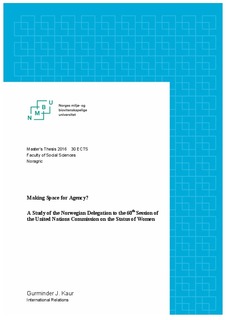| dc.contributor.advisor | Kjosavik, Darley José | |
| dc.contributor.author | Kaur, Gurminder J. | |
| dc.date.accessioned | 2016-08-12T08:46:19Z | |
| dc.date.available | 2016-08-12T08:46:19Z | |
| dc.date.issued | 2016-08-12 | |
| dc.identifier.uri | http://hdl.handle.net/11250/2398938 | |
| dc.description.abstract | This thesis is a case study of the Norwegian delegation before and during the 60th session of the United Nations Commission on the Status of Women. The study has been conducted through data collection in meeting points of the state and civil society before CSW in Oslo, and during CSW in New York. The significance of this qualitative case study is that it provides insight into a unique case. The study is unique since it gives an insight into the practices of the delegation in their meeting points during one event that will not take the exact same shape again. The aim of the thesis is to provide the reader with thick description of the practices within meeting points. This contributes to in- depth knowledge on how the Norwegian state and civil society cooperates in one UN conference process and what the nature and objectives of the cooperation is. Anthony Giddens´ structuration theory and understanding of structure and agency is the main theoretical framework. In addition, this study has drawn upon constructivism and social movement theory to theorize access given by the structure and used by the agent. The findings of this study, supports the established perception of the Norwegian state´s institutionalized cooperation with civil society. This is evident through the many meaningful access points provided to a broad range of civil society in the process of CSW. The findings also show that the state incorporates civil society´s input in the state instruction, which describes the mandate of the delegation. The state receives civil society´s input in a facilitative and cooperative way during the whole process. Information about the state´s activities on the negotiations is not shared until Thursday the first week and perceived as constraining. The same type of information was shared in the open morning meetings for all civil society organizations and only for NGO members. The NGO members are part of the delegation because of the knowledge, experience and the constituency they represent. FOKUS views their purpose as being in the delegation to contribute to pushing the negotiations forward together with the state. FOKUS perceive the late information as constraining as they are not being involved actively in cooperation with the state to develop strategies in the morning meetings. As FOKUS and the state are two different institutions, they also have different understanding of which rules, procedures and strategies should prevail and at what time. Both parts are interested in collaboration to reach the goal of gender equality. The means to reach the goal are debated. | nb_NO |
| dc.language.iso | eng | nb_NO |
| dc.publisher | Norwegian University of Life Sciences, Ås | |
| dc.subject | Norwegian Delegation | nb_NO |
| dc.subject | Norwegian Civil Society- State Relations | nb_NO |
| dc.subject | United Nations Commission on the Status of Women | nb_NO |
| dc.title | Making space for agency? : a study of the Norwegian delegation to the 60th session of the United Nations Commission on the status of women | nb_NO |
| dc.type | Master thesis | nb_NO |
| dc.subject.nsi | VDP::Social science: 200 | nb_NO |
| dc.source.pagenumber | 86 | nb_NO |
| dc.description.localcode | M-IR | nb_NO |
